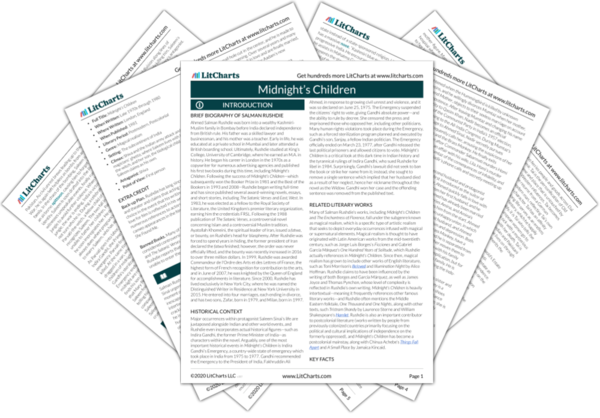Mary Pereira Quotes in Midnight’s Children
And when she was alone—two babies in her hands—two lives in her power—she did it for Joseph, her own private revolutionary act, thinking He will certainly love me for this, as she changed name-tags on the two huge infants, giving the poor baby a life of privilege and condemning the rich-born child to accordions and poverty…“Love me, Joseph!” was in Mary Pereira’s mind, and then it was done. On the ankle of a ten-chip whopper with eyes as blue as Kashmiri sky—which were also as blue as Methwold’s—and a nose as dramatic as a Kashmiri grandfather’s—which was also the nose of grandmother from France—she placed this name: Sinai.
Women have always been the ones to change my life: Mary Pereira, Evie Burns, Jamila Singer, Parvati-the-witch must answer for who I am; and the Widow, who I’m keeping for the end; and after the end, Padma, my goddess of dung. Women have fixed me all right, but perhaps they were never central—perhaps the place which they should have filled, the hole in the center of me which was my inheritance from grandfather Aadam Aziz, was occupied for too long by my voices. Or perhaps—one must consider all possibilities—they always made me a little afraid.
And while chutney—the same chutney which, back in 1957, my ayah Mary Pereira has made so perfectly; the grasshopper-green chutney which is forever associated with those days—carried them back into the world of my past, while chutney mellowed them and made them receptive, I spoke to them, gently, persuasively, and by a mixture of condiment and oratory kept myself out of the hands of the pernicious green-medicine men. I said: “My son will understand. As much as for any living being, I’m telling my story for him, so that afterwards, when I’ve lost my struggle against the cracks, he will know. Morality, judgement, character…it all starts with memory…and I am keeping carbons.”
What my aunt Alia took pleasure in: cooking. What she had, during the lonely madness of the years, raised to the level of an art-form: the impregnation of food with emotions. To whom she remained second in her achievements in this field: my old ayah, Mary Pereira. By whom, today, both old cooks have been outdone: Saleem Sinai, pickler-in-chief at the Braganza pickle works…nevertheless, while we lived in her Guru Mandir mansion, she fed us the birianis of dissension and the nargisi koftas of discord; and little by little, even the harmonies of my parents’ autumnal love went out of tune.

Mary Pereira Quotes in Midnight’s Children
And when she was alone—two babies in her hands—two lives in her power—she did it for Joseph, her own private revolutionary act, thinking He will certainly love me for this, as she changed name-tags on the two huge infants, giving the poor baby a life of privilege and condemning the rich-born child to accordions and poverty…“Love me, Joseph!” was in Mary Pereira’s mind, and then it was done. On the ankle of a ten-chip whopper with eyes as blue as Kashmiri sky—which were also as blue as Methwold’s—and a nose as dramatic as a Kashmiri grandfather’s—which was also the nose of grandmother from France—she placed this name: Sinai.
Women have always been the ones to change my life: Mary Pereira, Evie Burns, Jamila Singer, Parvati-the-witch must answer for who I am; and the Widow, who I’m keeping for the end; and after the end, Padma, my goddess of dung. Women have fixed me all right, but perhaps they were never central—perhaps the place which they should have filled, the hole in the center of me which was my inheritance from grandfather Aadam Aziz, was occupied for too long by my voices. Or perhaps—one must consider all possibilities—they always made me a little afraid.
And while chutney—the same chutney which, back in 1957, my ayah Mary Pereira has made so perfectly; the grasshopper-green chutney which is forever associated with those days—carried them back into the world of my past, while chutney mellowed them and made them receptive, I spoke to them, gently, persuasively, and by a mixture of condiment and oratory kept myself out of the hands of the pernicious green-medicine men. I said: “My son will understand. As much as for any living being, I’m telling my story for him, so that afterwards, when I’ve lost my struggle against the cracks, he will know. Morality, judgement, character…it all starts with memory…and I am keeping carbons.”
What my aunt Alia took pleasure in: cooking. What she had, during the lonely madness of the years, raised to the level of an art-form: the impregnation of food with emotions. To whom she remained second in her achievements in this field: my old ayah, Mary Pereira. By whom, today, both old cooks have been outdone: Saleem Sinai, pickler-in-chief at the Braganza pickle works…nevertheless, while we lived in her Guru Mandir mansion, she fed us the birianis of dissension and the nargisi koftas of discord; and little by little, even the harmonies of my parents’ autumnal love went out of tune.











